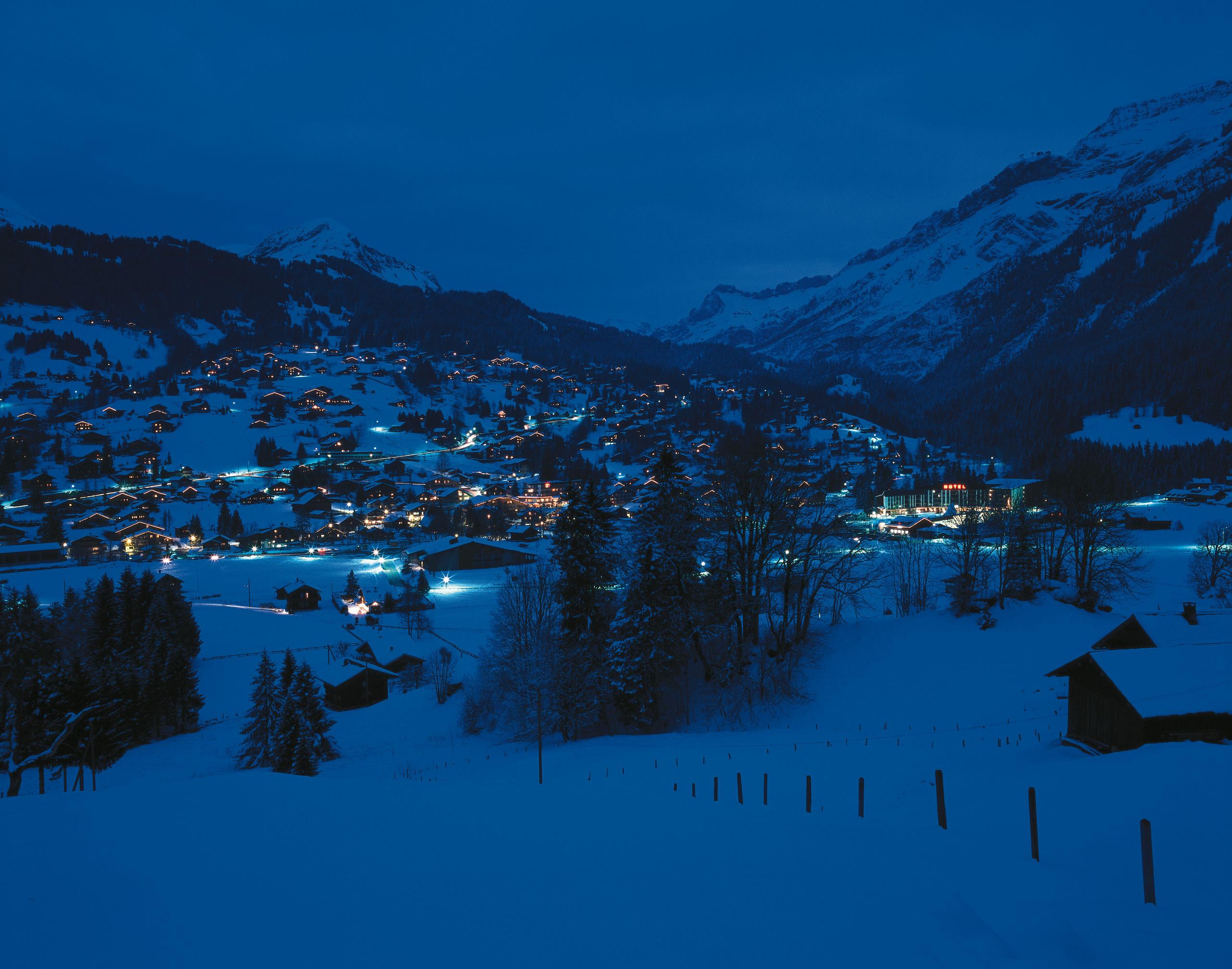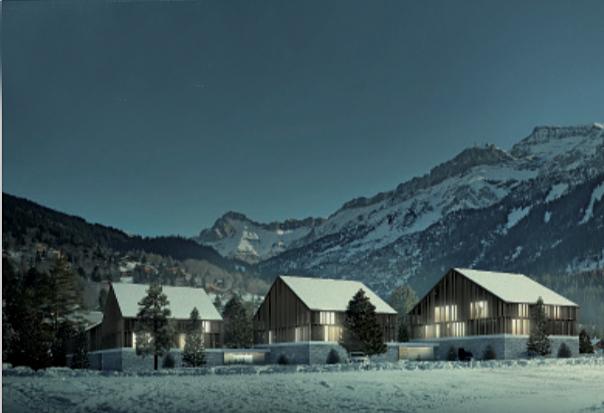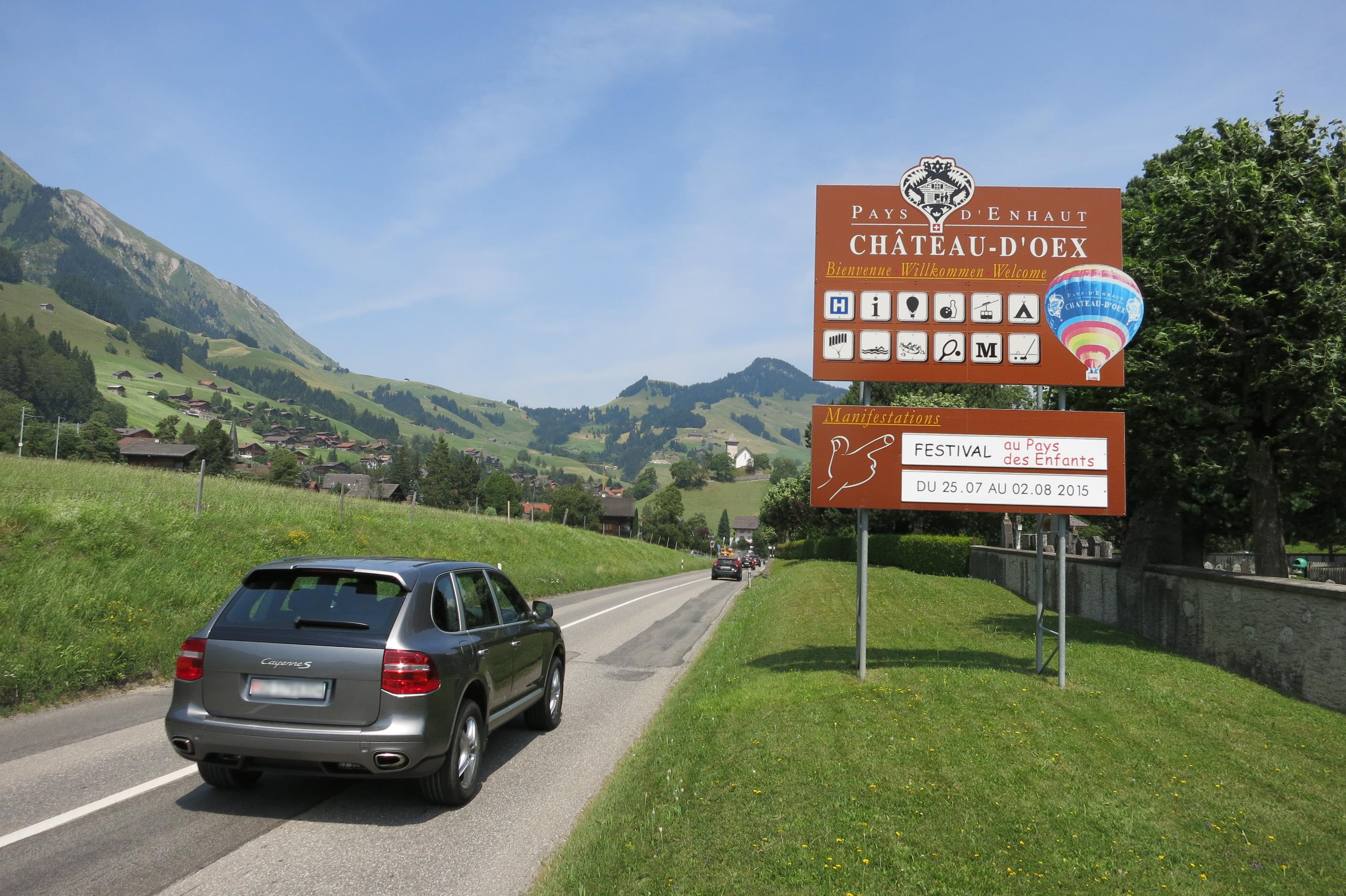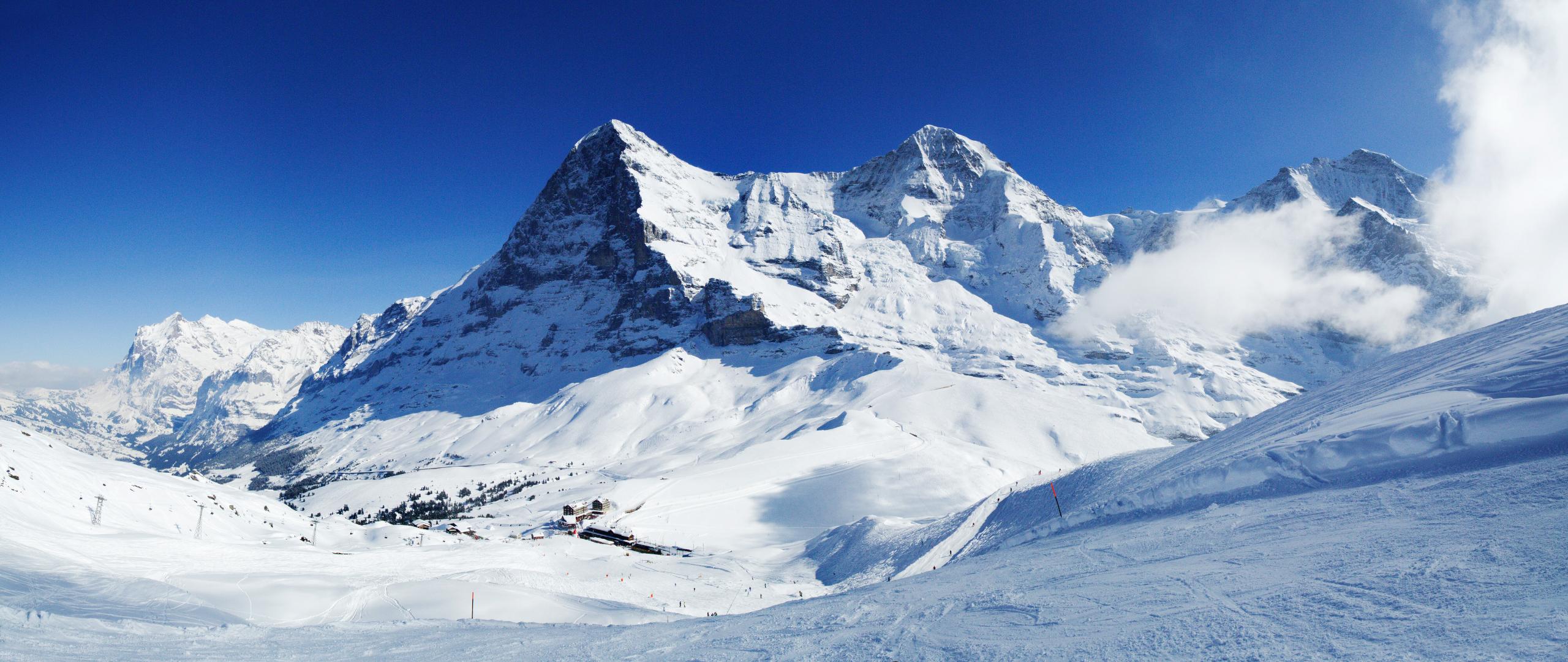Changing a mountain resort one vote at a time

In the alpine ski resort village of Les Diablerets, recently chosen to host the 2020 Youth Winter Olympics, adapting to economic realities and climate change has involved a process of consensus building amongst locals and a fair amount of patience.
Located at equal distance between the bigger and more luxurious resorts of Gstaad and Villars, Les Diablerets, in western Switzerland, has firmly identified itself over the years as a family resort. It has attracted generations of guests, most of whom return to their secondary homes during holidays and weekends, and who are often satisfied with the local status quo.
The extra influx in the winter means that the commune’s population multiplies in size from 1,400 to 10,000.
Many of the regular visitors end up retiring here, joining a core group of local residents.
“The Ormanans [after Ormont-Dessus, the commune’s official name] are mountain people by character, meaning that they like peaceful development, never go too quickly and never take steps that are too big,” says mayor Philippe Grobéty.
But changes have been creeping up on villagers, and in recent years, much discussion has been taking place at all levels in order to avoid falling behind other resorts.
In 2013, a report mandated by the cantonal tourism office said that by 2030, Les Diablerets, located at 1,200 metres above sea level, should expect to receive equal amounts of rain and snowfall, which is a lot wetter than the current three-quarters-snow-to-a-quarter-rain precipitation mix. By 2030External link, visitors would have to climb to 1,400 metres to get the same snow-rain mix that the town currently receives.
On climate change, Grobéty however remains optimistic: “We have the conviction that for 30 or 40 years – for the next generation – there will be snow at this altitude.” However, he admitted: “It’s true that global warming is a concern.”
And while maintenance of the sports infrastructure and hotel network has lagged due to an inability to access financing (see infobox), the strength of the Swiss franc and concerns about the freeze on building second homes have made some residents eager to take steps to re-energise tourism in this serene village.
“We cannot fall asleep and let this become an open-air elderly care home,” said Claude Paschoud, president of Les Diablerets tourism office committee. Referring to the many retiree residents, he added: “They don’t want noise, and don’t want to be disturbed.”
Tourism and political decision-making
The limited number of hotel beds in the resort has been a particular point of concern for Paschoud – who is also a sports shop owner – and for other Ormonans who rely on tourism. There are around 600 beds overall. After the village’s 1856 grand hotel, around which the resort developed, closed in 2011 to make way for more holiday flats, some locals reacted.
Paschoud explained that although Les Diablerets is fortunate to have 70% of its secondary residents coming from the nearby “Vaud Riviera”, along Lake Geneva, allowing them to visit more regularly than the many foreign counterparts in other resorts, having enough hotel rooms is essential for the local economy.
“We are really lacking in hotels to be able to work with ease.”
In 2012, the result of consultations with the local population on the future of Les Diablerets was published in a report entitled Vision 2025External link, which became the “central thread” for tourism development in the commune, according to the village’s mayor. Eleven working groups including some 120-150 people were involved.
The report found that developing year-round tourism was vital for the resort and future projects could focus on the theme of water, a key element in the local surrounding environment, which takes in the Diablerets glacier and the Grande Eau river.
Local government and the tourism office then got together and came up with the idea of developing a hotel and aquatic centre.
A project for the future
A public-private project soon evolved, when mountain resort developer Boas, founded by former Swiss ski champion Bernhard Russi, got wind of Les Diablerets’ plans.
Earlier this year, the commune and the developer began presenting the CHF14.5 million ($14.6 million) hotel and aquatic centre project to the public. The initial brochure explains that the scheme was “thought up jointly by the representatives of the Boas group, municipal representatives (with the assistance of the municipal commission resulting from the communal government), members of the sports park committee and consultants.”

The projectExternal link called “Les Isles” (the islands) proposes indoor and outdoor heated baths, a spa, the renovation of an existing sports centre, as well as a 60-bed three-star hotel, spread out over three chalets.
In addition to public financing from the canton for the aquatic centre, spa and the sports complex, the plan is to raise money from private contributors, including local residents. An initial pitch to locals has yet to bear any financial fruits though.
Moving ahead… slowly
“It’s still really slow,” Magali Donnet, responsible for communications at Boas, explained. She said that the possibility of buying shares in the project at CHF500 should allow some local residents to contribute. “The goal however would be to attract two or three larger investors to launch the plan more quickly.”
“I am not aware of any residents who would not like to have the project. These people have schools, they have children and families. The goal is to have more and more full-time residents living there.”
In a next step, the mayor explained that the population would be consulted on a public land use plan sometime during the winter until next spring. According to the schedule set by the partnership, formal discussion with residents will then take place, before any opposition to the plan is addressed at the end of 2016.
For many years, hotels in Les Diablerets reacted slowly to competition from other resorts, and lagged behind on needed renovations.
A number of wealthy investors with regional links meanwhile stepped in. Like Kristian Siem, a Norwegian billionaire whose family has owned property in Les Diablerets.
In 2006, he and Geneva banker René De Picciotto bought shares in Diablerets Vrai Village de Montagne. The group purchased the resort’s grand hotel, which was later transformed into holiday apartments, as well as two other village establishments.
In addition to the hotels, Siem also bought shares in Télé-Diablerets, the ski lift company, providing financing for snow machines.
Economic realities, including the effect of the strong franc, meant that hotels often had to lower rates to keep tourists coming. Claude Paschoud, president of Les Diablerets tourism office committee, explained that for many years due to the hotels’ inability to access financing due to low reserve funds, renovations were put off.
“For a very long time, it had all stopped”.Pachoud said that within the small community, where most people were involved in tourism, and knew each other, village representatives are usually eager to find a consensus and avoid playing party politics.
Some horse-trading was nonetheless inevitable when representatives try to reach an agreement. “Certainly some will have to make concessions, but everyone has their turn at doing so. It’s a good approach in order to get ahead. But it requires investing oneself personally and having lots of time, in order to get the right result.”
Opposition to the new project will have impact on completion plans, he added. “One can always discuss and oppose, but if appeals take place, judicial mechanisms will take over.”
If the commune is able to come to an agreement with opponents, the project would move ahead for official approval by the village council and then by the canton.
Democracy’s frontline
In the months and possibly years to come, the future of Les Iles is expected be discussed and fought out on Les Diablerets’ democratic frontline. At the village’s popular watering hole, L’Ormanan, where all matters are deliberated, some of the clientele remained unconvinced by the project.
Jean-François, a retired mountain guide and ski instructor, described the plan as “a private idea that was politically supported”.
He questioned whether the plan’s offering of hotel rooms would satisfy the additional demand resulting from the new spa centre. “If we create something new, shouldn’t we think about the number of beds, and if there will be enough? The calculation may be a bit unbalanced, so I am a bit pessimistic about the project.”
The development and updating of Les Diablerets ski lifts have also been the focus of much attention.
In 2013, after a cantonal develop plan for the Vaudois Alps was publishedExternal link, the commune proposed a direct link from the village to the glacier above the Col du Pillon on the route linking Les Diablerets to Gstaad. Access to the glacier is limited via a bus link or by car. The project was later rejected as it would pass over a protected natural area.
More recently the authorities agreed to build a lift link from the base of the chair-lifts connecting the Les Diablerets to the neighbouring resort of Villars, and the village’s old bubble lift, on an opposite slope, Isenau. But over locals debating about the lift’s fly-over, cantonal authorities threatened that financing would only be offered if the connection departed from the Isles development.
Meanwhile, this summer lift operator Télé-Diablerets accepted to merge with Télé Villars-Gryon. Vaud’s parliament had made the amalgamation of the two operators a condition for financial support to the ski area.
“Right now it seems to me that this is a nascent project and that there is no precise formulation or vision that will win unconditional support.”
With Les Diablerets’ recent selection as the venue for alpine sports at the 2020 Youth Olympics, it is expected that more beds will be needed. Paschoud estimated that the resort would need another 500 to 600 beds to cope with the Olympics influx.
Athletes however are expected to be accommodated in a 1,700-bed residence to be built at the University of Lausanne, at the Games’ central host town. The city of Lausanne, Vaud and the confederation will be covering building costs there.
Lengthier, but preferable
The slow process of decision-making involving local consultation at every stage, is in stark contrast to resort developments elsewhere in the world.
In Canada, for instance, a report by the country’s Parks and Wilderness Society this year found that national parks were under threat from commercial development of ski resorts, where public consultation is minimal or simply ignored.
Les Diablerets’ mayor admitted that popular consultation often lengthened decision-making procedures. But he commented: “What is better? To go far in a democratic system? Or towards a dictatorship? I certainly prefer our system.”
Paschoud added. “To find a solution you need people who are open-minded, who have a vision for the future and who try their best. But sometimes you have to give in to the demands of other people to find a consensus. It’s very Swiss.”

In compliance with the JTI standards
More: SWI swissinfo.ch certified by the Journalism Trust Initiative










You can find an overview of ongoing debates with our journalists here . Please join us!
If you want to start a conversation about a topic raised in this article or want to report factual errors, email us at english@swissinfo.ch.